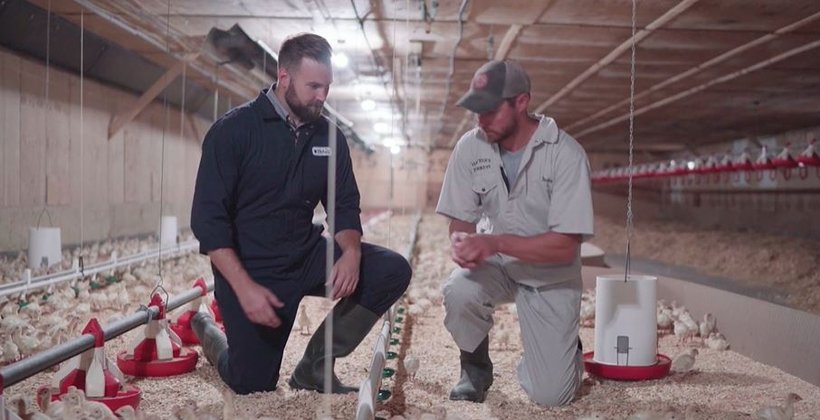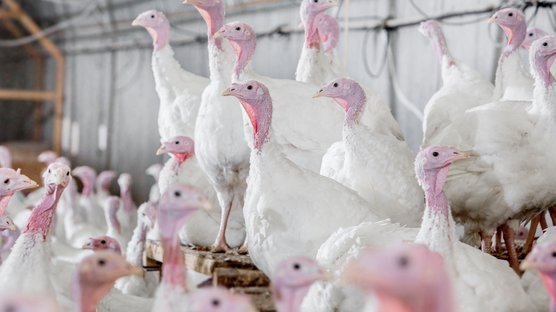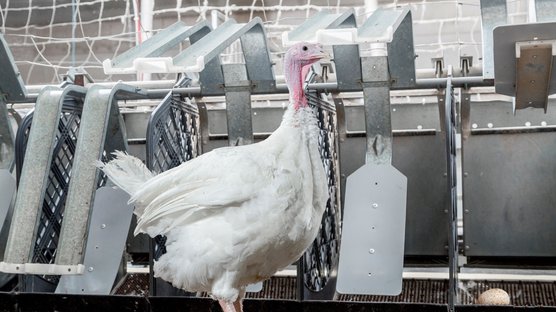
Published on Oct. 19, 2020
Ask an Expert: Owen Willems
In this edition of our Ask an Expert series, we meet Hybrid Turkeys Director of Research and Development, Owen Willems. Learn about his role and gain insights into how Hybrid works to evolve their breeds to meet the needs of the market, today and tomorrow. Find out about the North American and European pedigree facilities and learn what emerging technologies will impact the industry.
Tell us about your role
I am the Director of Research and Development for Hybrid Turkeys. In my role, I'm responsible for the genetic improvements of our pure-bred turkey lines. I ensure we are developing a portfolio of products that customers want, in a sustainable manner. In addition, I research and apply new technologies that come through our third-party partners and the academic stream to better our breeding program.
I understand you spent time working within various business units of Hendrix Genetics. How has this experience impacted your role today?
Yes, I worked as a Rotational Geneticist for a short time. In this role, I was stationed in various regions around the world and spent time learning the breeding programs of different species within Hendrix Genetics. For example, I spent time in the Netherlands learning about swine breeding followed by a stint in France to work with laying hens.
The goal was to give me a full range of genetic tools and experiences: dealing with multi-species data, learning how different breeding programs require different traits and unique ways to measure them, etc. I have since taken what I learned and applied it to our turkey breeding program. The experience also allowed me to network with customers from around the world and learn and appreciate the differences of each market.
What are the greatest challenges you face in optimizing and tailoring Hybrid products to meet the changing needs of the market?
With genetic improvements taking years to play out, our biggest challenge is trying to predict where the turkey market will be in 5 or 10 years. To be successful in this prediction, we look to our partners and customers to share field data and communicate their preferences and then we pair this with market insights to give us our roadmap. To account for further changes from our roadmap, we have structured our breeding program to offer flexibility in the direction we take our products.
The better we can collaborate with managers, farm employees, CEOs, etc, the better we can understand future needs and adapt our genetics to meet those needs.
How do market changes impact Hybrid's genetic development?
Market requirements are constantly evolving. Not so long ago the ‘needs’ were suggested by the next link in the value chain, but as time has gone on the feedback regarding what is needed and wanted by a market can stretch to the final consumer. For example, the market push for sustainability has led to a growing popularity of cell-cultured meats and alternative proteins within consumers. To address the topic of sustainability within our business we've evaluated the environmental impact of genetic gains from feed conversion. The more efficient we breed our birds, the lower their greenhouse emissions. Additionally, consumers want to be assured that the proteins they eat come from operations that care for their animals. We can address animal welfare in our breeding program by focusing on areas such as disease resistance and livability.
What are the benefits of having pedigree facilities on two continents?
The North American and European markets are very different and require unique products and solutions to suit their geographic regions. What makes having pedigree systems and pure line genetics on both continents so important is that it enables us to address the genotype by environment interaction. The bird that performs the best in North America isn't necessarily the bird that will perform the best in European conditions. What this means is we can evaluate how environmental factors, such as density, feed, heat sources, or bacterial challenges for example, affect the performance displayed and then make selections based on this combination of genetics and environment. Dual pedigree systems allow us to take these differences into account and then breed a product in the location where it will be sold to optimize performance in the local conditions.
Are there any emerging technologies positioned to impact Hybrid's genetic approach?
The first major innovation that will impact the poultry industry in general is in-ovo sexing - the ability to sex the animal while it is still in the egg. The second is gene editing or GMOs, which may or may not develop over the next decade, depending on consumer interest and acceptance.
In my opinion, the most impactful technological advances in the near-term are the ones that allow us to measure more phenotypes on individual birds in a more accurate manner. Examples include video tracking for movement or behaviour, advances in artificial insemination, and the application of human field technologies such as CT scanning. These technologies not only help us gather more data for our breeding program, they also offer enhanced welfare for both turkeys and workers.
The main focus for Hybrid Turkeys is on high-throughput phenotyping to increase the number of measurements and to improve the accuracy of measurements on individual animals thus improving our genetic output.
How does Hybrid Turkeys maintain its position on the cutting edge of agricultural science and technology?
Primary research starts with Hendrix Genetics' central research and technology division. They're a team of research geneticists who look into cutting-edge academic publications and collaborate with third-party breeding ‘Think Tanks’. They do the primary research before handing it off to us in the breeding program to determine which implementations will benefit customers and address future market needs. It is through that academic collaboration that we're able to stay on that cutting edge of technology.
Hybrid Turkeys aims to collaborate with customers and industry partners in the turkey value chain to ensure they deliver products and solutions that meet market needs today and in the future. We invite you to contact your Hybrid Turkeys representative to talk about your goals and what the turkey of the future looks like to you. As Partners in Excellence, we can contribute to a sustainable turkey industry.
Want to learn more?
Our team is happy to answer your questions. Click the button to send us a message and a member of our team will connect with you.



